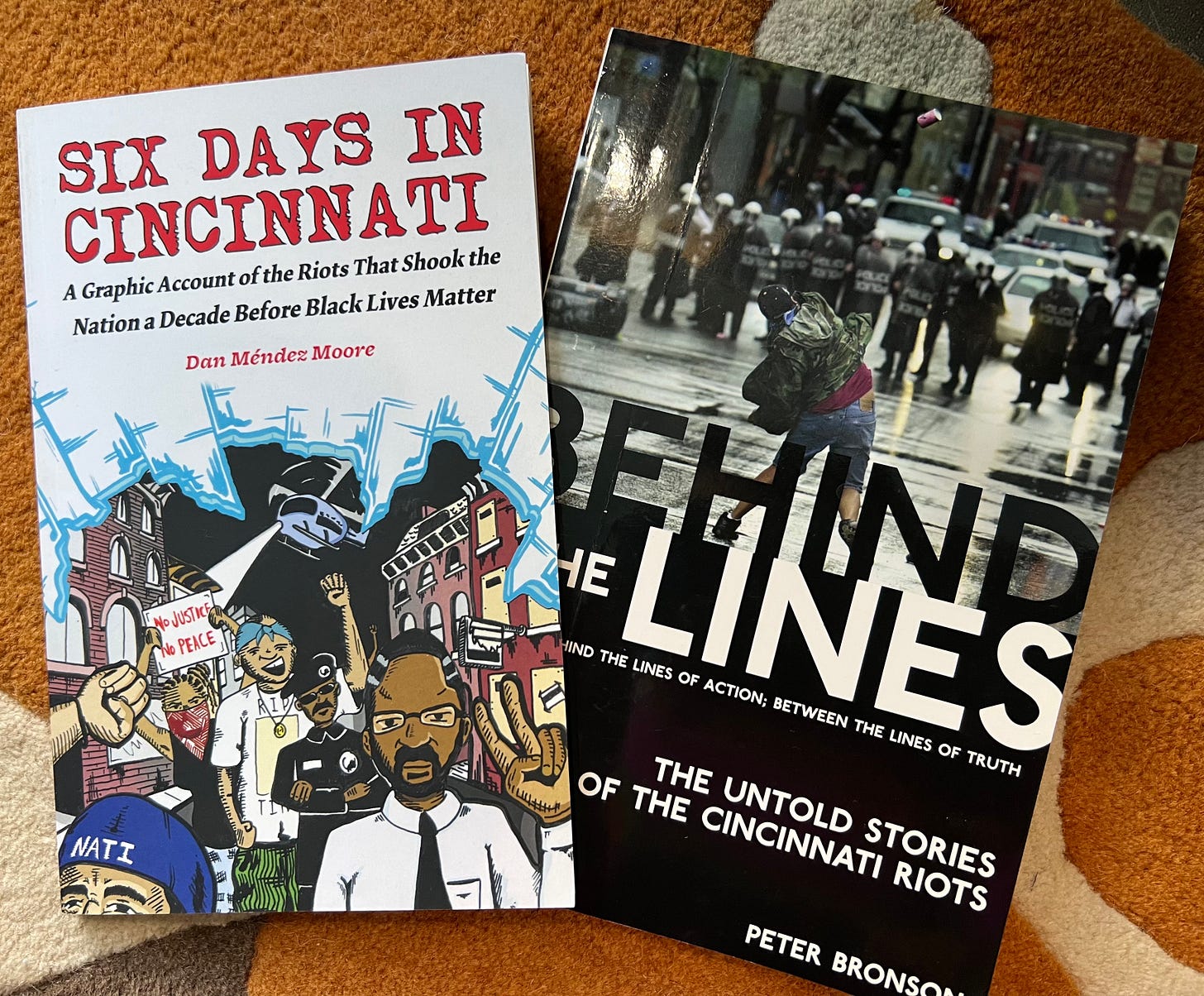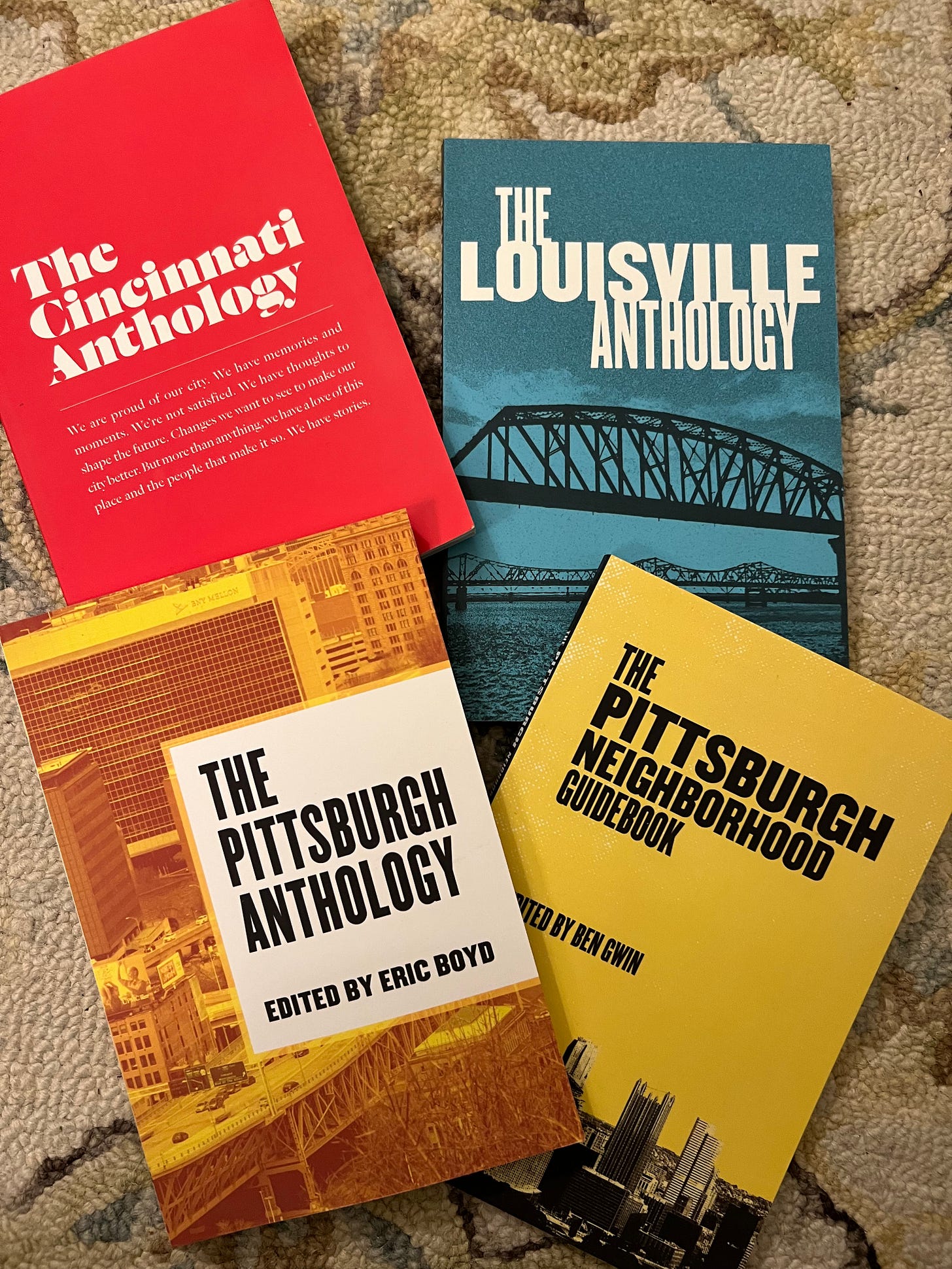Ohio Valley Books
Here's what I've been reading lately
Say what you will about the algorithms of online sellers, for me, there’s no way to outdo a human bookseller near your research. During my June research trip to Kentucky, I went on book-buying sprees at Roebling Books and Coffee in Covington, and Carmichael’s Bookstore in Louisville. Here’s the scoop on some of the titles I bought and why.
Germans in the Ohio Valley
My recent post about Covington, Kentucky mentioned the large influx of Germans to the Cincinnati area after the Great War (WWI). I couldn’t have written it without the scholarship of Don Heinrich Tolzmann, whose books I pictured here. I will rely on them as I continue exploring the region. Thanks to Emily at Roebling Books for introducing them to me.
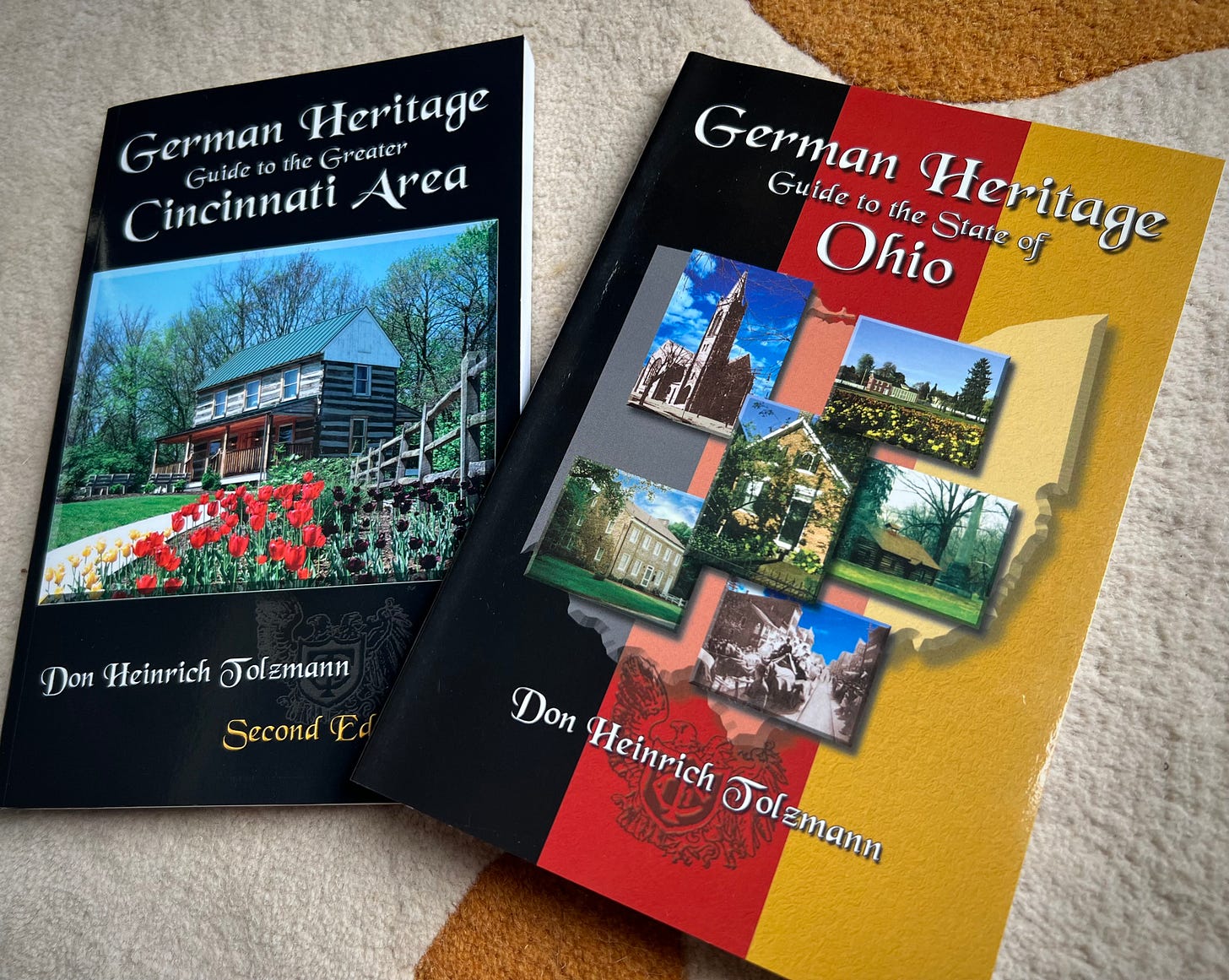
Underground Railroad
Emily at Roebling also turned me onto these books set in Ripley, Ohio, 50 miles upriver from Cincinnati. I photographed them with a brochure from Clermont County’s Freedom Trail, because they are all linked to the Underground Railroad. Clermont County was home to several abolitionist communities, where many southerners moved and freed their enslaved workers. President Grant was born in Clermont County.
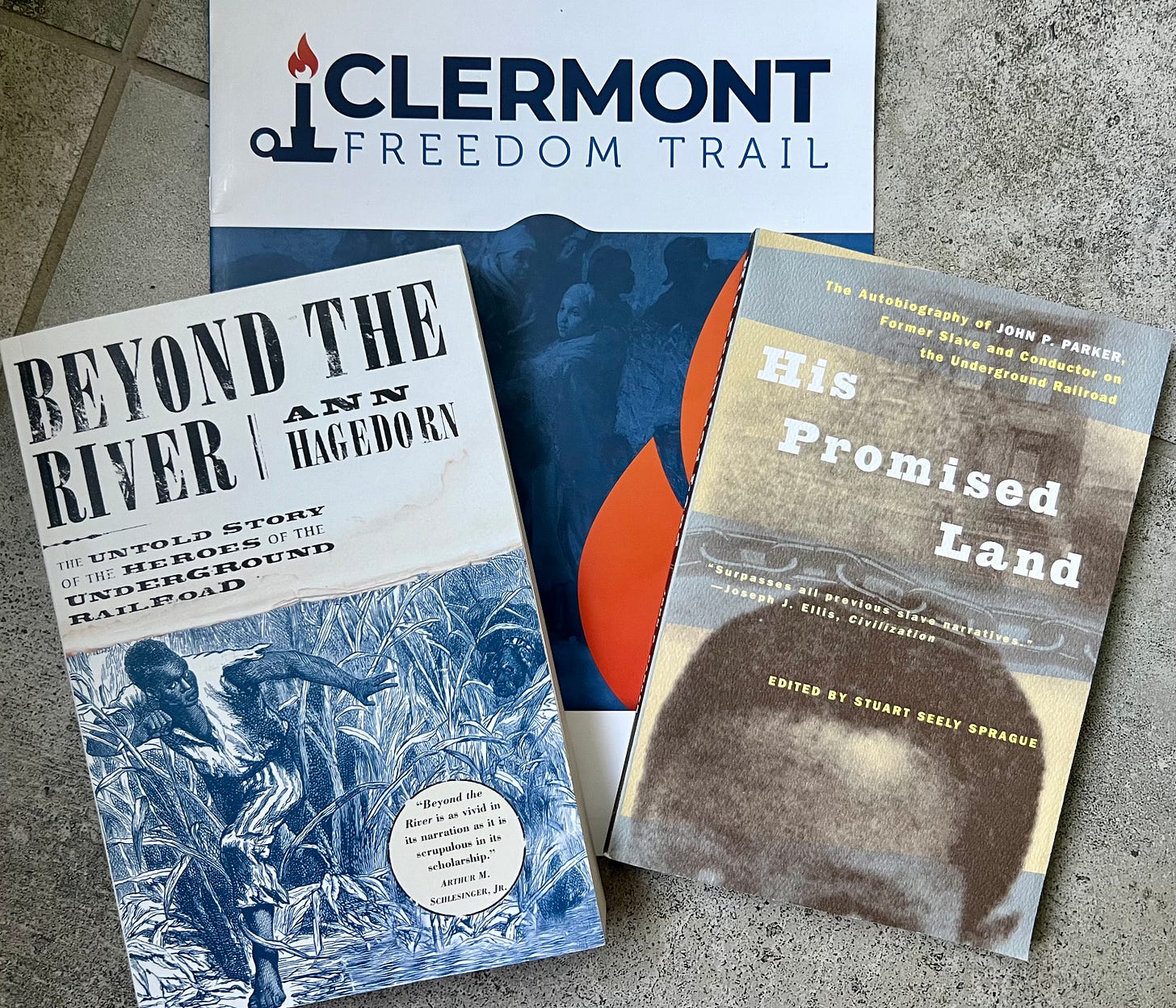
Beyond the River brings to life the stories of men and women, both Black and white, who fought against slavery along the Ohio River through the Ripley line of the Underground Railroad. I’ve heard the Underground Railroad movement called “the war before the war.”
His Promised Land is a slave narrative from John P. Parker, who may be the most interesting American ever born. Born to an enslaved mother and a white Virginian “aristocrat,” he was sold at the age of eight and eventually bought his freedom after many harrowing runaway attempts detailed in the book. When he made it to Ohio, he literally worked day and night; by day as an inventor and business owner, and by night as a conductor on the Underground Railroad. He was issued US patents for an improved tobacco press, a portable tobacco press, and soil pulverizer, and used his earning s to send his sons to university. Someone should make a biopic of him.
Louisville
Sometimes the best way to absorb history is through the lens of a small community—instead of a metropolis, state, region, or country.
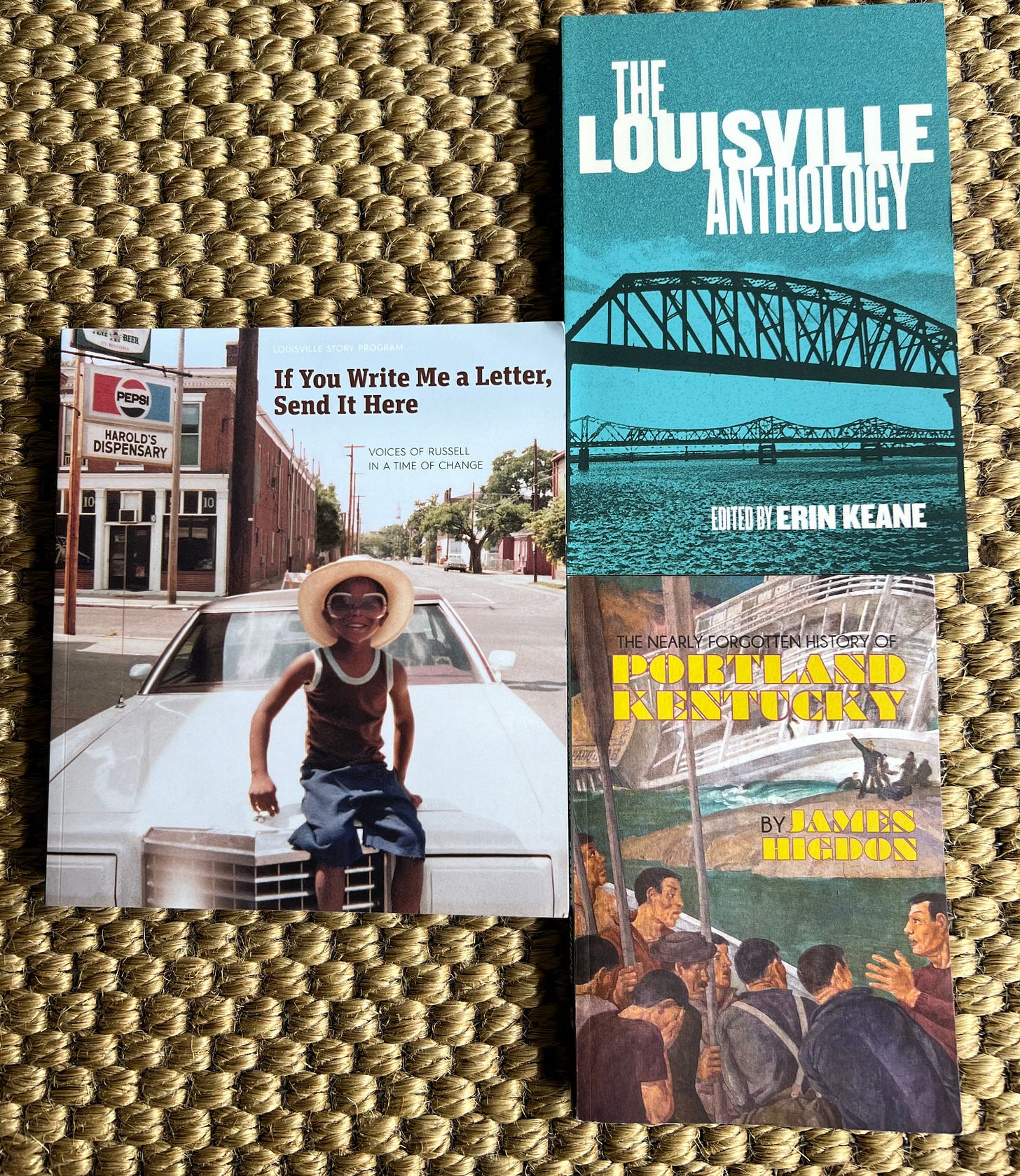
If You Write Me a Letter, Send it Here, is a collection of essays by Russell residents about the neighborhood's history, current state, and future prospects. Honestly, I bought this book based on its cover, but I am reading the stories because they’re insightful. The gorgeous full-color book on thickly coated pages is a project of the Louisville Story Program.
To the far right is a micro-history of another Louisville neighborhood, Portland. The Nearly Forgotten History of Portland Kentucky starts with pre-history and colonial history, then carries us through through the Industrial Revolution and the Civil War. We see how the Ohio River town shaped the destinies of Daniel Boone, Abraham Lincoln, Henry Clay, William Lytle, John James Audubon, and Lewis & Clark, as well as America’s first female riverboat captain Mary Millicent Miller.
I’ll tell you about The Louisville Anthology (pictured center) in the section below.
Cincinnati
I bought two books about the 2001 uprising in Cincinnati that really bookend the spectrum of opinion on why the riots raged, what was at stake, and what was accomplished in the aftermath. This uprising took place five months before the bombing of the Twin Towers on September 11, 2001, so that may be why you don’t remember it.
For those who like to “do their own research,”before making up their mind, here’s your big chance. The graphic story in Six Days In Cincinnati is from the viewpoint of a man who was in high school when he joined the protests against police violence. Behind the Lines, written by the former editorial page editor of the Cincinnati Enquirer, it focuses on the major players in the conflict and concludes with what happened to each of them in the aftermath. Nary the twain accounts shall meet, which is still the case in present day discourses. Sigh.
Kentucky History
I have always been a horsey girl. I’ve toured several Thoroughbred racing barns in the Bluegrass region, as well as the tracks at Keeneland and Churchill Downs, so you won’t be surprised that I’m reading Hidden History of Horse Racing in Kentucky. This slim book is full of historical photographs and etchings. I’ll knock it out in a weekend.
The two other books pictured here explore aspects of Kentucky’s history as a slave state. When Congress established the Northwest Territory (north of the Ohio River) as slavery free in 1787, the river became the longest slave boundary in the United States.
I’d love to do an experiment with average Americans and ask if Kentucky was a Union or Confederate state. I would have failed the quiz. Kentucky did not join the Confederacy, although it was a slave state.
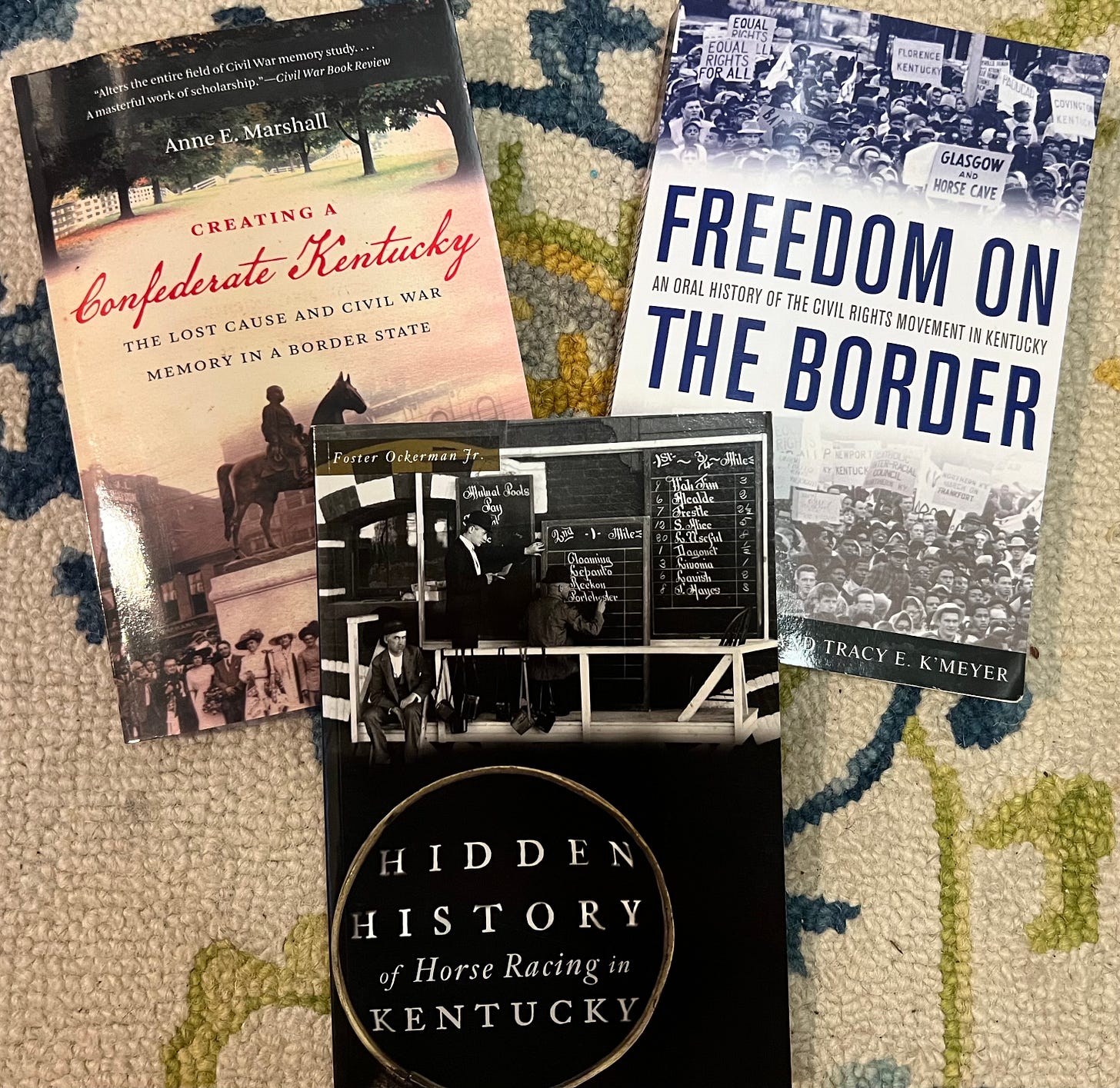
Creating a Confederate Kentucky, explains why Kentucky acts like a former Confederate state up to the present day, although it never seceded. This identity didn’t begin to form until the war was over. I’m being simplistic here, but in a nutshell, white Kentuckians had expected to be rewarded for their loyalty by being permitted to remain a slave state.
In the words of one Kentucky soldier, “I enlisted to fight for the Union and the Constitution, but Lincoln puts a different construction on things and now has us Union Men fighting for his Abolition Platform and thus making us a hord of Subjugators, houseburners, Negro thieves, and devastators of private property.” I’m about a third of the way through it now, and will give you an update when I finish.
Freedom on the Border is a curated collection of oral histories from folks who lived during the civil rights movement. Both white and Black voices are included for each topic. I’ve read the first chapter, “Living Under Segregation,” that includes a story from a white woman who had invited a college friend from New York home to Louisville for the weekend:
…we’re walking down the platform to go into the station, and I turn around and Sandy is white as a ghost. I mean, she’s stopped in her tracks and she’s white as a ghost…I followed her eyes, where she was looking, and what she saw was white/colored: white drinking fountain, colored drinking fountain, white waiting room, colored waiting room. She was horrified…It took this experience with a stranger for me to see it…I had never seen it before.
City Anthologies
Belt Publishing offers a wide range of city anthologies and neighborhood guidebooks for Rust Belt cities. They include essays, poetry, and sometimes graphic stories from writers with unique perspectives on what it’s like to live, work, and love in each city.
I’ve seen some of the anthologies in indie bookstores (including Carmichael’s in Louisville) but you can buy them directly from the publisher or from any online retailer.
Okay, now it’s your turn to recommend books from the Ohio River Valley. I’m especially interested in topics from Indiana and Illinois, as well as local booksellers in both states. I’ll be up that way again soon.


